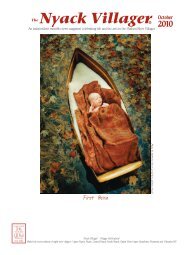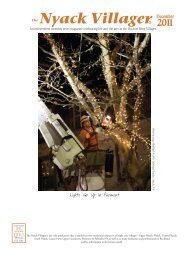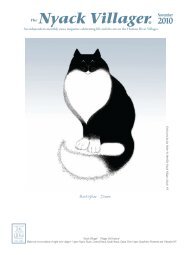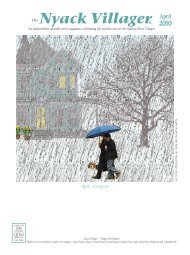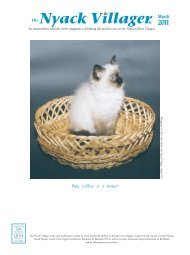DEC '08 - The Nyack Villager
DEC '08 - The Nyack Villager
DEC '08 - The Nyack Villager
Create successful ePaper yourself
Turn your PDF publications into a flip-book with our unique Google optimized e-Paper software.
Under exposed<br />
by Shel Haber<br />
<strong>The</strong> Yellow Stripe in the Road<br />
e yellow stripe painted down the middle<br />
of most roads reminds us that cars to the<br />
left of the stripe stay to the left and cars to<br />
the right stay on the right.<br />
As a community we agreed on these rules of<br />
the road to keep cars moving and avoid headon<br />
collisions. is agreement is a regulation.<br />
ere are other regulations: stop at a red light,<br />
go on green. e first thing you learn as a<br />
new driver is to follow the rules of the road, to<br />
(probably) avoid wrecking your mother’s car.<br />
Back in 1929 banks and Wall Street had no<br />
real regulation, no rules, so when a greedy and<br />
corrupt stock market crashed, it took the rest<br />
of the economy with it. Most banks kept little<br />
cash on hand, speculating on the market<br />
instead. ere was no regulation for insurance<br />
on savings accounts so when Wall Street went<br />
belly-up, the life savings of millions of honest<br />
people went down the drain.<br />
e bank failures of 1929 caused the Great<br />
Depression and led to the closing of countless<br />
good companies large and small. Millions of<br />
jobs were lost.<br />
ere was no social security for the old, no<br />
unemployment insurance for those unable to<br />
find a job. Millions of hard woking people<br />
went on bread lines to void starving. is<br />
went on year after year.<br />
When Franklin Roosevelt<br />
became president<br />
in 1933 we began to<br />
dig ourselves out of the<br />
economic hole.<br />
As a community,<br />
America agreed to regulate<br />
banks and Wall<br />
Street. In Roosevelt's<br />
first hundred days in office, a law was passed<br />
(the GS act) to separate investment banking<br />
from commercial banking. at stopped the<br />
wild Wall Street speculation. Another law was<br />
passed, creating e Federal Deposit Insurance<br />
Corporation (FDIC) which insured bank<br />
deposits. en the Roosevelt administration<br />
created social security and unemployment insurance.<br />
ere were many nay sayers who said the new<br />
regulations were unamerican and forecast the<br />
doom of free enterprise. But free enterprise<br />
prospered instead, with fifty years of increasing<br />
good times. ere were small bumps<br />
along the way but the middle class grew continuously<br />
and many more people grew rich.<br />
Beginning in the Reagan years, the men who<br />
ran giant banks wanted much more of the nation’s<br />
wealth and seemed unwilling to share<br />
the good times.<br />
Using their influence and giant campaign<br />
contributions, Wall Street bankers slowly had<br />
laws passed that dismantled the banking laws<br />
and, by 1999, when the Gramm-Leach-Bliley<br />
act passed, many of the 1933 laws were gone<br />
—no more separation of investment banks<br />
(the speculators) and commercial banks<br />
(whom we trust to hold our money). Wild<br />
speculation resumed, converting the US banking<br />
system from a market to a casino.<br />
We American consumers seemed drugged by<br />
I want it ALL, I want it NOW, credit cards<br />
and mortgages. e banks had a great time<br />
offering credit at interest rates that made the<br />
old gangster loan sharks look like the Good<br />
Tooth Fairy,<br />
As it turned out, the banks didn’t actually have<br />
the cash to cover all the loans and mortgages<br />
so they used last month’s payments to cover<br />
next month. When the Wall Street casino ran<br />
out of chips, they called on taxpayers to buy<br />
them new ones. ey had painted out the yellow<br />
stripe on the financial highway and changed<br />
all the lights to green.<br />
On Sept 19, 2008 the Bush adminstration announced<br />
we were on the edge of a financial car<br />
wreck and called on the American taxpayers to<br />
bail out Wall Street or we would have another<br />
Great Depression. If the men who run the<br />
giant banks and Wall Street had been less<br />
greedy, retaining the 1939 rules of the road,<br />
we would not be in this financial trouble and<br />
the banks that went bankrupt would still be in<br />
business.<br />
Now you and I, the taxpayers, have to bail out<br />
the greedy speculators to save the economy.<br />
Again.<br />
Perhaps, now we will paint the yellow stripes<br />
back on the economic highway.<br />
Shel Haber co-publishes <strong>The</strong> <strong>Nyack</strong> <strong>Villager</strong> ✫<br />
e Restoration<br />
Carpenter<br />
by George Maniere<br />
Leaving your home in Winter<br />
It happens every Winter. A family goes away<br />
from home for a few days and, instead of<br />
turning the heat down, they turn it off. During<br />
a cold snap, the temperature inside even<br />
the best insulated house will drop below freezing<br />
when the heat is turned off. e outcome<br />
is predictable, messy and expensive. Standing<br />
water in the pipes can expand up to 10%<br />
when it freezes, bursting the pipes. e house<br />
will likely flood during the coldest time of the<br />
year—a nasty predicament to be in, involving<br />
extensive clean-up and expensive repairs.<br />
Make sure everyone in the house knows the<br />
heat stays on during Winter. Set the thermostat<br />
to 50°—enough to protect what needs<br />
protecting; it won't cost that much to heat an<br />
empty home to minimal temperatures.<br />
Another way to stop pipes from freezing is to<br />
open several faucets and let them<br />
drip very slowly. Moving water<br />
freezes at a lower temperature<br />
than still water—the reason lakes<br />
freeze over while rivers still run.<br />
By keeping the faucet on, you<br />
keep the water moving, preventing<br />
it from freezing. While this<br />
will work, it wastes water and is<br />
expensive. We don’t like the idea<br />
of wasting water.<br />
If, for some reason,you must shut off the heat,<br />
the best strategy is to insulate all the pipes. If<br />
they are below the house and vulnerable to<br />
winds and outdoor temperatures, they must<br />
have a layer of pipe insulation to keep them<br />
protected. is is a really simple solution to a<br />
potential problem that could cost thousands.<br />
Pipe insulation is readily available at any hardware<br />
store. is insulation slips over the pipe<br />
and has a self-sealing tab. All joints in the insulation<br />
should be wrapped in duct tape to<br />
ensure a continuous seal.<br />
A sure-fire way to insure that your home will<br />
not be flooded when you return is to shut off<br />
the water and drain the house.<br />
Open all the faucets. Leave them<br />
open and shut off the water at<br />
the meter. Don’t forget to close<br />
them when you refill the system.<br />
Once the system is refilled, go to<br />
each faucet, remove the aerator<br />
cap and open the faucet until<br />
you have a continuous stream of<br />
water. Now shut off the faucet<br />
and replace the aerator cap. is<br />
idea can eliminate the fear of leaving your<br />
home and could potentially save you thousands<br />
of dollars by preventing pipes from<br />
freezing and bursting.<br />
George Maniere, a carpenter & general contractor,<br />
makes his home in Sparkill. His column returns<br />
to e <strong>Nyack</strong> <strong>Villager</strong> afer a long absence.<br />
He encourages readers to call him with questions<br />
on home repair: (845) 613-7737 or cell (845)<br />
656-4022. ✫<br />
VJE<br />
10 <strong>The</strong> <strong>Nyack</strong> <strong>Villager</strong> December, 2008




